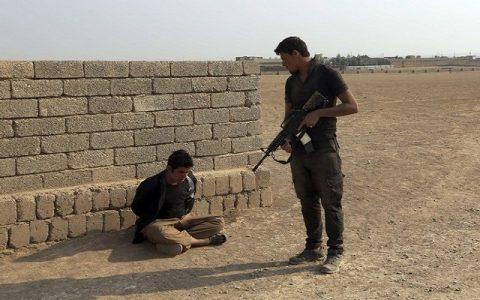
ISIS extremists shave beards as pressure builds on Mosul
ISIS fighters were shaving their beards and changing hideouts in Mosul, residents said, as Iraqi forces moved ever closer to the city on Wednesday and civilians fled in growing numbers.
Several residents in Mosul said the extremists seemed to be preparing for an assault after recent advances on the eastern front brought elite Iraqi forces to within five kilometres of the city limits.
“I saw some Daesh members and they looked completely different from the last time I saw them,” said a resident of eastern Mosul who gave his name as Abu Saif.
“They had trimmed their beards and changed their clothes,” said the former businessman. “They must be scared … they are also probably preparing to escape the city.”
Residents and military officials said many ISIS fighters had relocated from eastern Mosul to their traditional bastions on the western bank of the Tigris river, closer to escape routes leading to Syria.
The special forces were undertaking clean-up operations in areas retaken from the militants to the east of the city, where troops uncovered a vast tunnel network used by IS to shuttle fighters and supplies by motorcycle, said Maj. Salam Al Obeidi.
To the south of Mosul, another Iraqi commander said ISIS has been withdrawing from the town of Shura, its stronghold between Mosul and Qayyarah, toward the city, taking civilians with them to use as human shields and leaving behind explosive booby-traps to slow the troops’ advance.
Some 3,000 to 5,000 IS fighters are believed to be inside Mosul, Iraq’s second city, alongside more than a million trapped civilians.
The sounds of fighting on the northern and eastern fronts of the Mosul offensive could now be heard inside the city, residents said, and aircraft of the US-led coalition were flying lower over the city than usual.
Tens of thousands of Iraqi fighters have been advancing on Mosul from the south, east and north after the offensive was launched on October 17 to retake the last major Iraqi city under ISIS control.
The assault has air and ground support from the coalition, as well as advisers on the ground.
The Iraqi minister for displacement and migration, Jassem Mohammed Al Jaff, said more than 3,300 civilians fleeing the fighting had sought help from the government the day before, the highest number in a single day so far.
“We used to live in terror night and day, the shelling was coming closer, ISIS controlled our lives, so we decided to flee,” said Essam Saadou, a 22-year-old student.
Numbers of displaced residents were growing but stood at a relatively low 8,940 on Wednesday, according to a UN tally, because most of the fighting so far has taken place in sparsely populated areas.
Civilians in villages on the eastern outskirts of Mosul were being bussed to a camp near Khazir.
“The army made us get out, they told us to leave and said we would see about the details of our settlement,” said Umm Ali, a 35-year-old woman.
A wave of displaced residents was also expected from Shura, the main staging base on the southern front. As the noose tightened on Mosul, 13 defence chiefs from the 60-nation coalition meeting in Paris set their sights on Raqqa, in Syria, which would be the last major city under ISIS control if it loses Mosul.
“We have already begun laying the groundwork for our partners to commence the isolation of Raqqa,” said US defence secretary Ashton Carter.
As well as thousands of air strikes, the coalition – which also includes Britain and France – has provided support in the form of training for Iraqi forces and advisers on the ground.
France said Wednesday it had extended the mission of its aircraft carrier, the Charles de Gaulle, in the eastern Mediterranean until at least mid-December to help the offensive on Mosul.
The Paris talks also centred on the futurepost – ISIS of Mosul. As well as coping with the huge humanitarian operation which is bound to ensue, there is the matter of Mosul’s status as ethnically and religiously mixed region.
In Baghdad, Iraqi president Fuad Masum on Wednesday called for rethink on banning alcohol. The ban on selling, importing and producing alcohol slipped into a law on municipalities which was passed on Saturday.
Without referring specifically to alcohol, Mr Masum called for a revision so that the law would respect “the freedoms and rights of citizens of different religions and doctrines.”
Source: /The National





